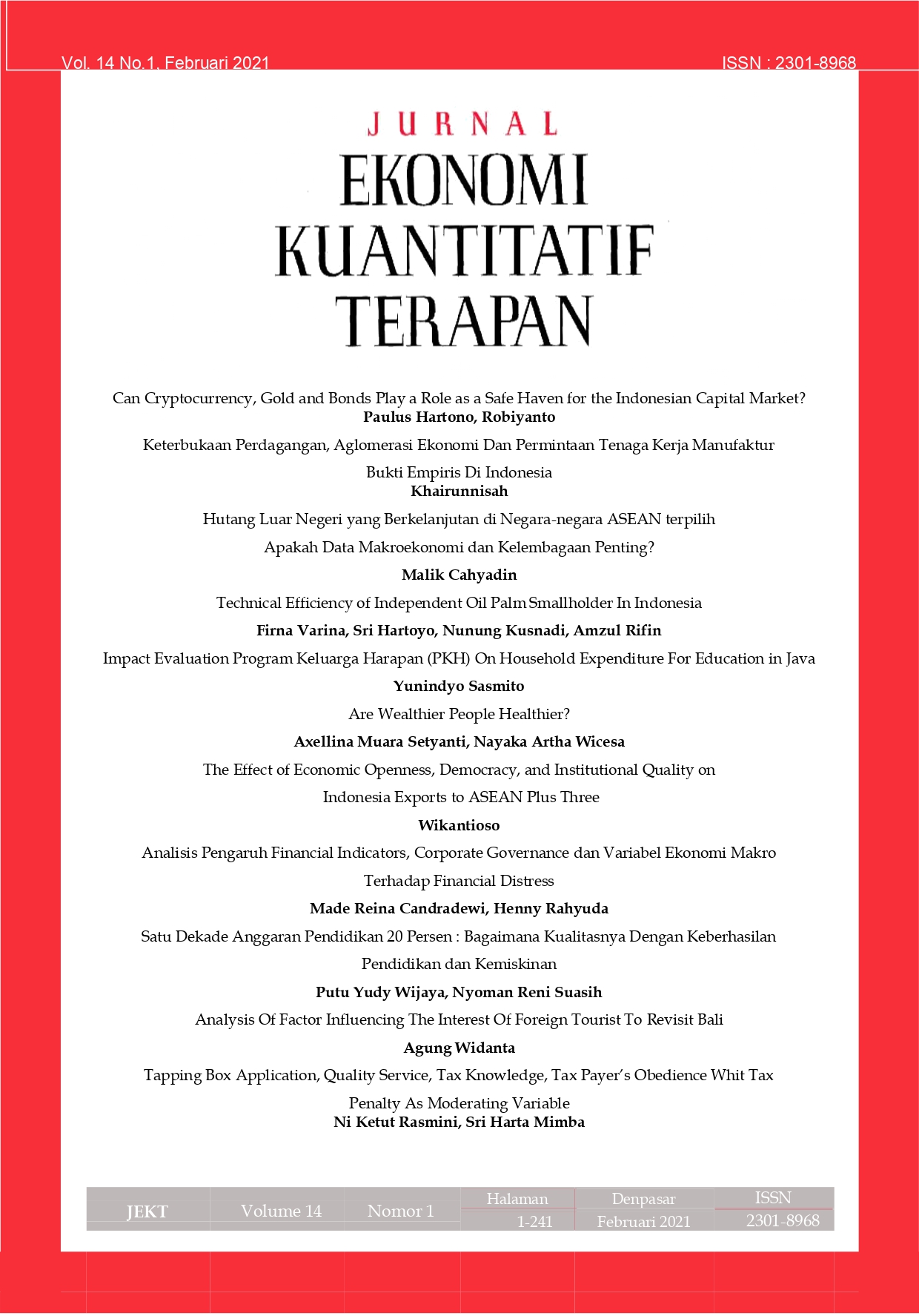Impact Evaluation Program Keluarga Harapan (PKH) On Household Expenditure For Education in Java
Abstract
Poverty becomes a global problem including developing countries and developed countries. To overcome the problem of poverty, various countries have implemented poverty alleviation programs in the form of a Conditional Cash Transfer (CCT) policy package. In Indonesia, the CCT program is named PKH. This program requires prerequisites (health and education) to program recipients to get out of the cycle of poverty. This study aims to determine the impact of PKH on household spending on education in Java using IFLS 5 data in 2014.
This study uses the Propensity Score Matching analysis method. Previous research shows that PKH in Indonesia has no significant impact on total household expenditure on education. By dividing the components of education expenditure, this paper has successfully demonstrated the significant impact of increasing total education expenditure in the household by IDR 1,031,963.53 per year. The increase also occurred in the total transportation costs of IDR 603,085.86. While the total education expenditure outside the household for PKH recipients declined by IDR 277,475.49 per year.
Downloads
References
Almunawaroh, D. F. (2016) Dampak Kebijakan Program Keluarga Harapan Terhadap Konsumsi Rumah Tangga Indonesia Tahun 2014. Universitas Gadjah Mada.
Bappenas (2009) ‘Laporan Akhir Evaluasi Program Perlindungan Sosial: Program Keluarga Harapan 2009’. Available at: http://perpustakaan.bappenas.go.id/lontar/file?file=digital/98524-[_Konten_]-Konten C6575.pdf.
BPS (2020) Profil Kemiskinan di Indonesia September 2019. Jakarta. Available at: https://www.bps.go.id/pressrelease/download.html?nrbvfeve=MTc0Mw%3D%3D&sdfs=ldjfdifsdjkfahi&twoadfnoarfeauf=MjAyMC0wNy0wNiAxMzo0MTo0MA%3D%3D.
Caliendo, M. and Kopeinig, S. (2008) ‘Some practical guidance for the implementation of propensity score matching’, Journal of Economic Surveys, 22, pp. 31–72. doi: 10.1111/j.1467-6419.2007.00527.x.
Guo, S. Y. and Fraser, M. W. (2010) Propensity Score Analysis: Statistical Methods and Applications, Counterfactual Framework and Assumptions.
Lechner, M. (2002) ‘Some practical issues in the evaluation of heterogeneous labour market programmes by matching methods’, Journal of the Royal Statistical Society. Series A: Statistics in Society. doi: 10.1111/1467-985X.0asp2.
Nazara, S. and Rahayu, S. K. (2013) Program Keluarga Harapan (PKH): Program Bantuan Dana Tunai Bersyarat di Indonesia, International Policy Centre for Inclusive Growth. Jakarta. Available at: http://www.tnp2k.go.id/images/uploads/downloads/PKH IPC Policy Research Brief__Bahasa-2.pdf.
Rosenbaum, P. R. (2005) Sensitivity Analysis in Observational Studies Randomization Inference and Sensitivity. Edited by Brian S. Everitt & David C. Howell. Chichester: Encyclopedia of Statistics in Behavioral Science. doi: https://doi.org/10.1002/0470013192.bsa606.
Rosenbaum, P. R. and Rubin, D. B. (1983) ‘The central role of the propensity score in observational studies for causal effects’, Biometrika. doi: 10.1093/biomet/70.1.41.
Soares, F. V., Ribas, R. P. and Osório, R. G. (2010) ‘Evaluating the impact of Brazil’s Bolsa Família: Cash transfer programs in comparative perspective’, Latin American Research Review.
Sulistyaningrum, E. (2016) ‘Impact Evaluation of the School Operational Assistance Program (Bos) Using the Matching Method’, Journal of Indonesian Economy and Business, 31(1), p. 33. doi: 10.22146/jieb.10319.
TNP2K (2014) Reaching Indonesia’s Poor and Vulnerable and Reducing Inequality: Improving Programme Targeting, Design, and Processes. Jakarta. Available at: http://www.tnp2k.go.id/images/uploads/downloads/Report_REACHING_Mar30_LR.pdf.




















